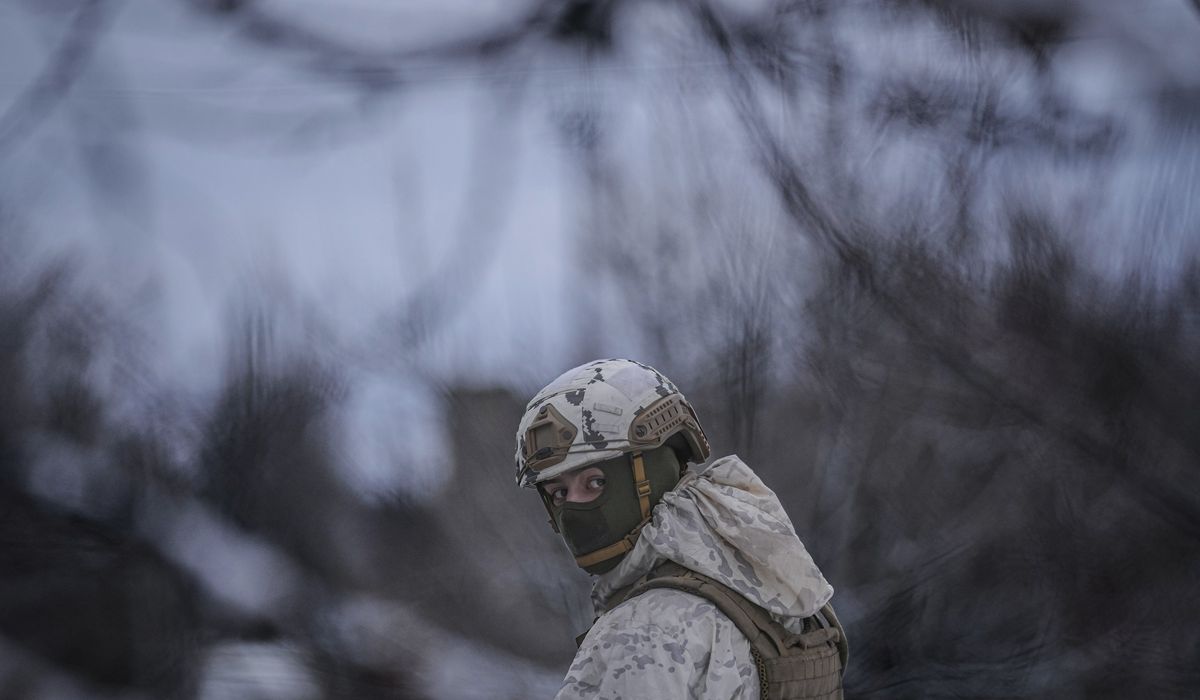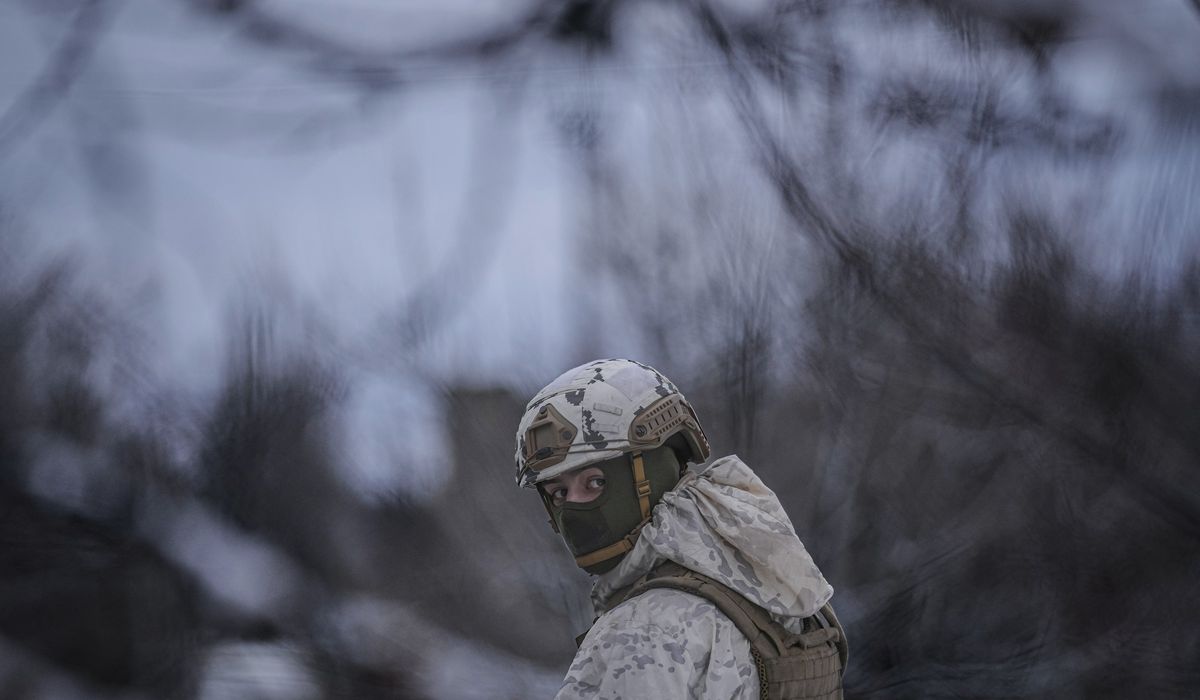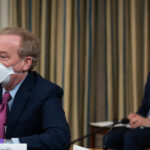
NEWS AND ANALYSIS:
The State Department is warning that intelligence information indicates Russia is set to conduct a covert disinformation operation in Ukraine that will be used as a pretext for an invasion.
State Department spokesperson Ned Price told reporters on Monday in releasing intelligence on a potential “false flag” operation by Moscow during the current Ukraine standoff that it would be similar to the ruse the Russians applied prior to the 2014 takeover of Ukraine’s Crimean Peninsula.
That invasion was preceded by false reports claiming Russians in Crimea were being attacked, including the claim that a three-year-old Russian boy had been crucified by anti-Russian Ukrainians and therefore Moscow had no choice but to invade.
Mr. Price said the intelligence suggests the Russians are preparing “to fabricate a pretext for this aggression very similar to what they did in 2014.”
“This is why we are so concerned about what we are seeing now and what we know now,” he said.
Pressed by reporters to disclose details of the intelligence, Mr. Price, a former CIA analyst, declined to provide additional information, noting concerns about protecting intelligence sources.
“Even as we seek to expose Moscow’s efforts, we don’t want to jeopardize or potentially jeopardize our ability to collect this kind of information going forward,” he said. “But when we do the cost-benefit analysis and we consider if the choice is between putting forward necessarily incomplete, sometimes broad, sometimes general information in an attempt to deter aggression, or, on the other hand, if the choice is to keep that to ourselves and potentially not play every card available to us, that’s not a difficult choice.”
The objective of releasing the partial information is to deter an attack and, “if we’re not able to do that, to expose what Moscow has had in mind all along.”
Mr. Price first disclosed intelligence on the possible false flag pretense for a Ukraine invasion last week. He was challenged by Associated Press reporter Matt Lee for what he said was moving into “Alex Jones territory” — a reference to the broadcaster known for promoting conspiracy theories — without giving the evidence to back it up.
Mr. Price then accused the reporter of acting on behalf of Russian propaganda. He later apologized in a tweet.
On Monday, Mr. Price said his words were “inartfully” expressed, but added the threat of Russian disinformation efforts is “still very present,” he said.
“We have previously noted our strong concerns regarding Russian disinformation and the likelihood that Moscow might seek to create a false flag operation to initiate military activity,” Mr. Price said Feb. 3. “Now, we can say that the United States has information that Russia is planning to stage fabricated attacks by Ukrainian military or intelligence forces as a pretext for a further invasion of Ukraine.”
The intelligence stated that a possible option is producing a Russia-produced propaganda video using graphic scenes of false explosions, corpses, actors pretending to mourn and images of destroyed locations.
“We don’t know if Russia will necessarily use this or another option in the coming days,” Mr. Price said. “We are publicizing it now, however, in order to lay bare the extent of Russia’s destabilizing actions towards Ukraine and to dissuade Russia from continuing this dangerous campaign, and ultimately, launching a military attack.”
DIA shoots down ABC News on pandemic
What was touted as a bombshell exclusive from ABC News has been strongly challenged by the Defense Intelligence Agency, according to a Freedom of Information Act response from the military spy service.
In April 2020, ABC News reported that the DIA’s National Center for Medical Intelligence produced a secret report in November 2019 detailing the early spread of the COVID-19 disease. The report stated that the DIA briefed the Trump White House on the intelligence, suggesting presidential negligence.
At the time the report was aired, the medical center’s director, Dr. R. Shane Day, an Air Force colonel, denied the report. But the denial did not stop the allegation from spreading like the virus itself all over Washington’s news media. The Washington Times filed a Freedom of Information Act request for the document shortly thereafter.
While it is not unusual for an agency head to deny a news report, having the agency’s independent FOIA office ferret through databases in an effort to try to find the document in question is a more definitive response.
On Feb. 1, the DIA’s FOIA office responded to the Times’ Rowan Scarborough, who sought access to the reported document. The agency noted the backlog of requests for documents as responsible for the lengthy delay in responding.
The letter from the chief, Records and Open Government, noted the request for documents related to the claims in the April 8, 2020, ABC news report and added: “Based on the information contained in your request, DIA searched its systems of records for responsive documents. Despite a thorough search, no documents responsive to your request were found.”
On that evening and on the ABC News website, the network said: “As far back as late November, U.S. intelligence officials were warning that a contagion was sweeping through China’s Wuhan region changing the patterns of life and business and posing a threat to the population, according to four sources briefed on the secret reporting.”
“Analysts concluded it could be a cataclysmic event,” one of the sources said of the NCMI’s report. “It was then briefed multiple times to the Defense Intelligence Agency, the Pentagon’s Joint Staff and the White House.”
However, the FOIA letter to the Times basically concludes none of that happened.
An ABC News spokeswoman did not immediately respond to an email request for comment.
China, Russia cement ties
As Russia amasses more than 100,000 troops near its tense border with Ukraine, China and Russia issued a statement outlining closer strategic cooperation signed by Chinese President Xi Jinping and Russian President Vladimir Putin in Beijing.
The statement refers to the “redistribution of power in the world” and nefarious efforts by “some actors” — a veiled reference to the United States — seeking a “resort to force” and meddling in others’ internal affairs.
“Friendship between [China and Russia] has no limits, there are no ‘forbidden’ areas of cooperation, strengthening of bilateral strategic cooperation is neither aimed against third countries nor affected by the changing international environment and circumstantial changes in third countries,” the statement says.
The declaration also claimed “democracy” is practiced by both authoritarian states that have systematically stifled freedom and democracy. Attempts to impose democracy on China and Russia are described in the statement as “attempts at hegemony” that undermine the stability of world order.
China and Russia agreed in the statement to promote “Greater Eurasian Partnership in parallel and in coordination with the Belt and Road construction” — China’s economic program to gain influence through funding infrastructure problems around the world.
“Russia and China stand against attempts by external forces to undermine security and stability in their common adjacent regions, intend to counter interference by outside forces in the internal affairs of sovereign countries under any pretext, oppose ‘color revolutions,’ and will increase cooperation in the aforementioned areas,” the statement says.
The two countries also oppose the expansion of the NATO alliance and alliances in the Asia Pacific, including the U.S.-led strategy in the Indo-Pacific, such as the U.S., Australian and British nuclear submarine deal.
The statement says Beijing supports Moscow’s efforts to create legally-binding security guarantees in Europe, but did not mention Ukraine.
China and Russia also claimed they oppose efforts to militarize space and are seeking an arms agreement on the issue — despite both nations’ deployment of anti-satellite missiles.
State Department spokesperson Ned Price on Monday warned China that it could suffer consequences for supporting a Russian invasion of Ukraine.
“It would be our hope, given the implications of a renewed Russian aggression and certainly Russian invasion of Ukraine, that [China] would have taken advantage of a dialogue of this relationship to encourage Russia to pursue the course of diplomacy and de-escalation,” he said.
Secretary of State Antony Blinken spoke recently with Chinese Foreign Minister Wang Yi about a Russian attack on Ukraine and told him such a move would impact the world.
“If, in the end, China is seen as having supported Russia’s move to choose conflicts or war over diplomacy, it will cost China in terms of how it’s seen in the eyes of the world,” Mr. Price said. “It will have an effect on [China’s] global reputation.”
Health, The New York Today





